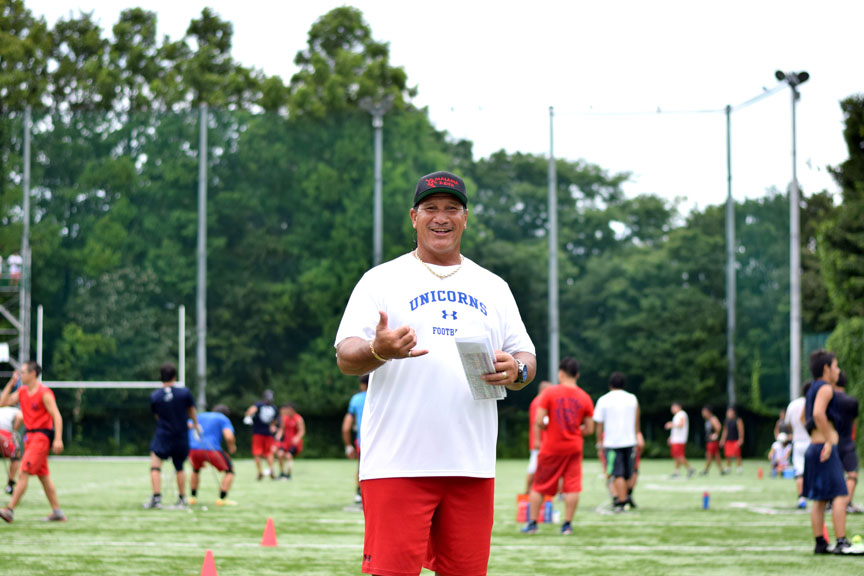From the Hawaii surf to Keio’s stadium turf, David Stant is making waves in Japan.
It’s a rainy day at Keio University with a typhoon heading this way, but Keio Unicorns Coach David Stant couldn’t be more stoked. After a vigorous morning of practice – the last one before the American football season starts – he looks forward to surfing some typhoon swell in Kamakura.
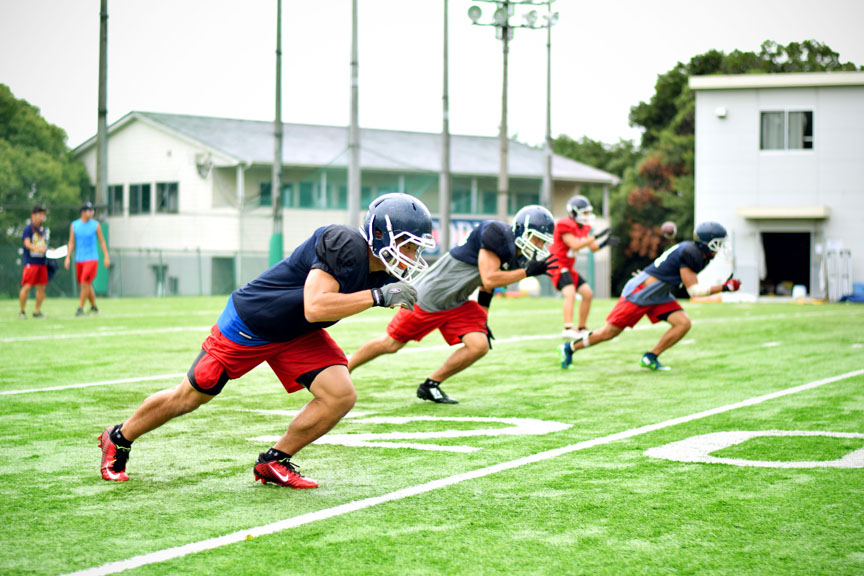
“I get the best of two worlds here,” Stant says. “I get to do what I love, coaching football and surfing. I love surfing during typhoons and, once we’re done with practice, I’ll go surf.”
Football and surfing might seem like dissimilar pursuits. One look at Stant, and you might wonder how he embraces both worlds as well as wonder how this Hawaiian guy ended up in Japan.
Stant caught his first wave when he was 8 years old near his home on Oahu’s North Shore. His father, David Stant Sr., was one of the founders of the prominent North Shore surfing patrol club Da Hui.
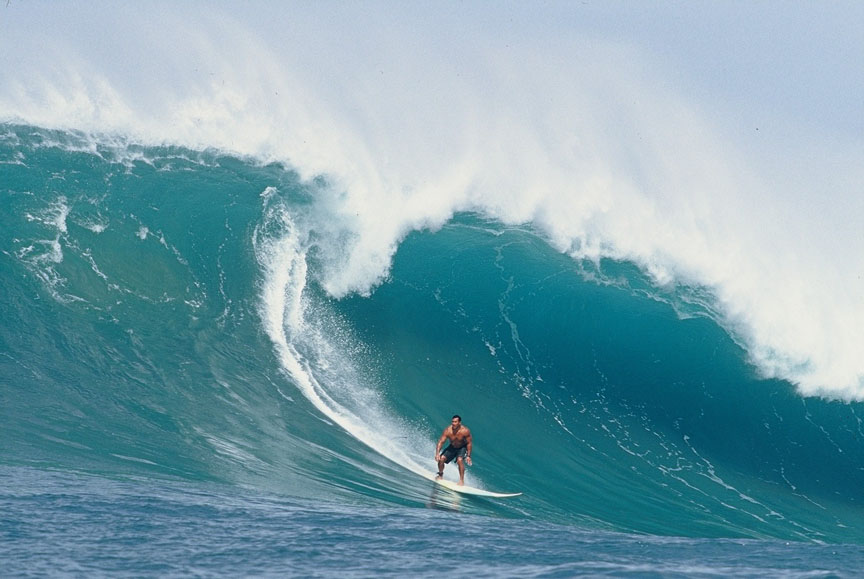
“Surfing is my first love,” Stant says. “My line comes from Duke; we got that lineage with surfing. Duke Kahanamoku taught my dad surfing, then my dad taught me.” As he got older, he fell in love with football. His father was initially against this, fearing Stant would get injured. But as most teenagers would react, this made him want to play even more. He couldn’t stay away from the water and still managed to fit surfing into his busy routine.
“I wasn’t a real good student. I would go surf during school, come back in time for lunch, then go to (football) practice,” he laughs. After high school, a year at Southern Oregon University and a serious knee injury, he returned to the islands. He needed to get back into the sports scene and decided to try professional surfing. He hated it.
“Once I decided to go pro, surfing became a job. I always had to surf, always had to compete,” he said. He was also a good 80 pounds heavier than the average surfer. “Most pro surfers are smaller, so they can surf tiny waves. But not me,” he said.
Fate brought him back to football when Arizona Western came looking for a linebacker. He received a full scholarship and played there for two years, then earned another offer from perennial powerhouse Wisconsin. He turned it down. “There’s no surf there,” he points out.
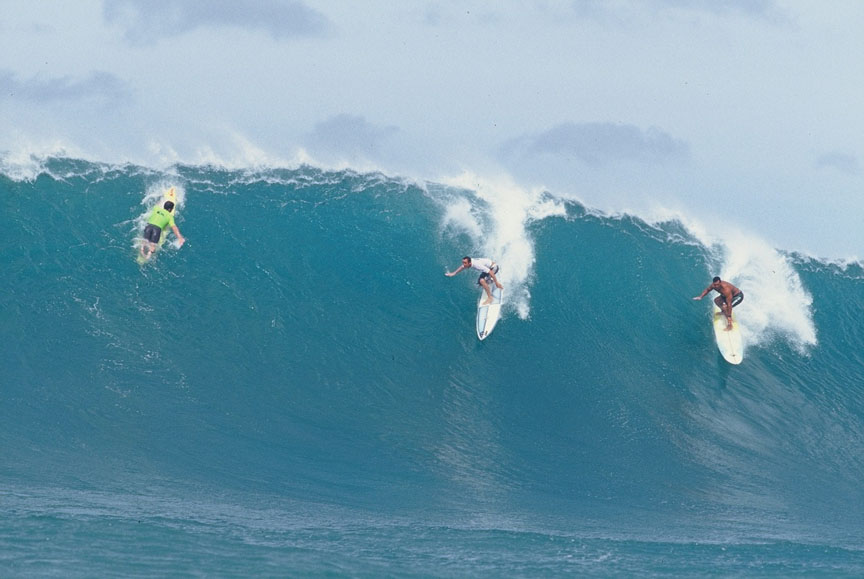
Instead he returned to Oahu, earning a full scholarship from the University of Hawaii Warriors. He continued to surf in his North Shore backyard and was an alternate for the Eddie Aikau Invitational. It was a hectic, crazy three years as Stant rushed from the South Shore for football to the North Shore to surf.
At 27, Stant was one of the oldest college players in the country. He was too small to make the NFL and had already undergone more than 25 surgeries. But as luck would have it, recruiters from the Japanese football team Seagulls visited the Warriors during Stant’s senior year and brought him on board.
With some basic Japanese knowledge, he arrived in Japan only to discover the X League, Japan’s top-level American football league, had banned foreigners after learning a Hawaiian player would be joining them. Little did Stant know the devastating blow to his playing days would kick off his coaching career. The Seagulls decided to keep Stant as a defensive line coach.
“When I started coaching, the Seagulls had just gone from Division 2 to Division 1. They were good, but they still had a ways to go,” Stant recalls. “But every year we got a little better as recruiting improved.”
By Stant’s third year, when he was promoted to head coach, the team started winning championships, thanks to the well-tuned chemistry between the players which Stant helped recruit to create the team he wanted.
In 2007, Stant moved back to pursue one of his dream jobs, coaching at Kamehameha School. But six years later, Japan called him back.
“At the beginning of 2013, my wife said, if the Seagulls go to the Rice Bowl this year, we should go (to Japan) and support them,” he recalls.
The Seagulls had already won two games in a row, so things were looking good. Stant’s wife booked flights for the whole family, and they witnessed the Seagulls win the Rice Bowl that season for the third consecutive time since 2011. During this vacation, Stant was approached by one of his former Seagulls players, Hiroki, and told him about a coaching job opening at Keio University.
Keio’s football team is unusual in that the players are not necessarily football players. “It’s a difficult school to get into, and the kids come for education—not football,” Stant explains as we watch his team of 175 players train.
Although most of them are in their freshman year and considerably smaller than the average football player, Stant is optimistic.
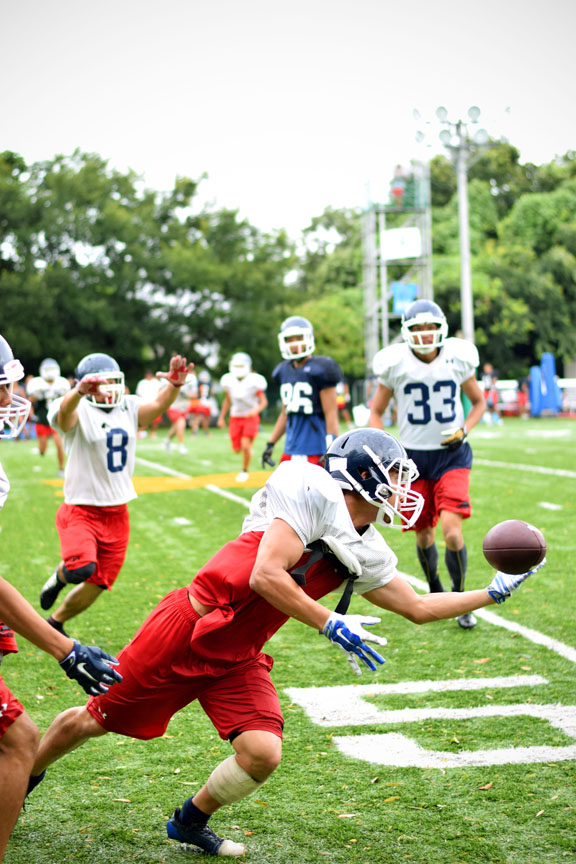
“We get good kids, smart kids. If we make it to the Koshien Bowl this year, the impact will be tremendous for football in Japan. It will show you also need to be smart to win,” he believes. The Unicorns currently place third in Kanto Region’s college football league with its main rivals being Waseda, Nichidai and Hosei University. One of Stant’s goals is to show that, although practice and muscle memory are important, it also takes strategy, recruiting and training to build a successful team.
Still, coaching a team at one of Japan’s top academic institutions comes with its challenges. “I have to come down on some of our guys when they overthink things,” he says.
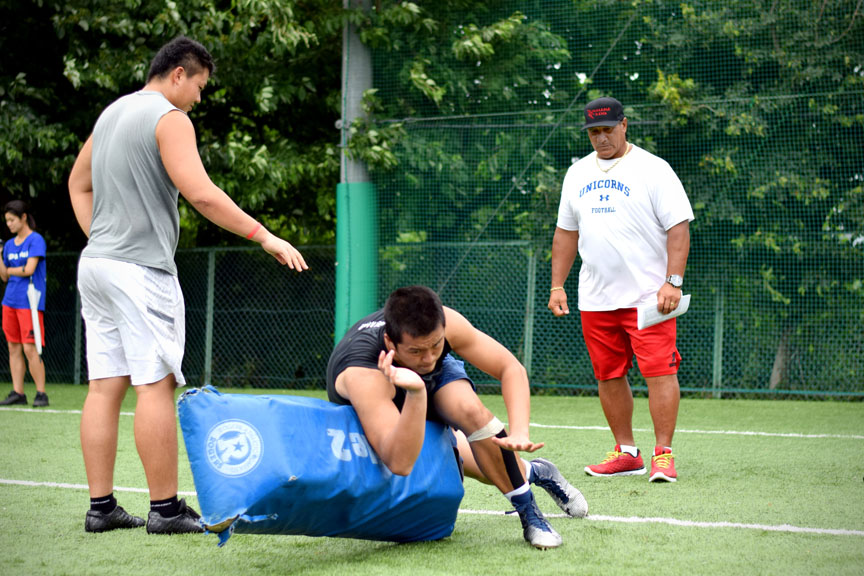
“I have to train them to let their bodies react. If you’re a fighter, you don’t think you’re going to jab; you just jab. Sometimes it’s good to think, but there are times they think too much. Hopefully we get the right formula.”
Between coaching, catching waves and visiting his family back home, Stant is a busy man. Yet he also finds time to expand the famous Da Hui clothing brand. He clearly enjoys it all and has no regrets, attributing his success to the people who supported and invested in him, and his belief that, “Everything in my life has been about timing and being prepared to do the job when it comes along.”
